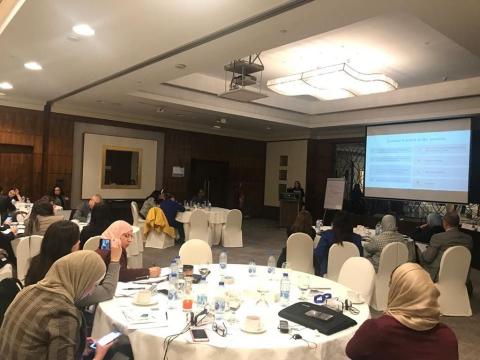

The Higher Population Council participated on Tuesday in the launch of the regional report “Gender Justice and Equality Before the Law in the Arab States Region: A Regional Analysis of Progress and Challenges”, organized by the UNFPA Arab States Regional Office, United Nations Economic and Social Commission for Western Asia (ESCWA), UNDP Regional Bureau for Arab States and UN Women Regional Office for Arab States.
The meeting aimed to provide a space for the exchange of experiences between different countries to consider the process of developing comprehensive laws on domestic violence and ways to build on the experiences of Arab countries that have passed domestic violence legislation, as well as to exchange information on ongoing efforts, as well as on mutual learning. Many countries in the region have made progress in this regard, including Jordan.
Amawi stressed during the workshop the importance of confronting domestic violence in society, explaining the role of the Family violence Protection Law of 2017, in bridging the gaps of the Family violence Protection Law of 2008, regarding the definition of family members, the concept of a legitimate relationship, the reporting and complaint mechanism and the resolution of family disputes.
Amawi referred to the lessons learned during the process of Family violence Protection Law 2017 legislation, the most prominent of which was international support and mechanisms for pushing the law-making process, and a gradual process of building consensus by focusing on services and then the law, although the important role of civil society organizations in mobilizing and supporting issues, and the importance of religious participation in the process of law legislation.
Amawi said that the most prominent principles underlying the law were a rights-based response, ensuring that the perpetrator was held accountable, developing control mechanisms, taking into account the different needs of women's groups who were subjected to violence, and the priority of the victim.
Amawi clarified the practical steps in the enactment and legislation of the law of protection against domestic violence and the contribution of HPC in this field, confirming that the most important challenges in this subject are the economic and gender social inequality, the lack of funding for women seeking justice, psychological and social support, the need for ongoing training of security personnel and social service providers in the Family Protection Unit.
It should be noted that the regional report is part of the Gender Justice Initiative, in the partnership of the UNFPA Regional Bureau for Arab States, the United Nations Economic and Social Commission for Western Asia, the UNDP Regional Bureau for Arab States and the United Nations Regional Office for Women in Arab States. This partnership aims to analyze legal systems throughout the Arab countries region, with reference to international standards that allow women's protection and equality before the law, knowing that the regional report is based on the 18 country reports launched in December 2018.







